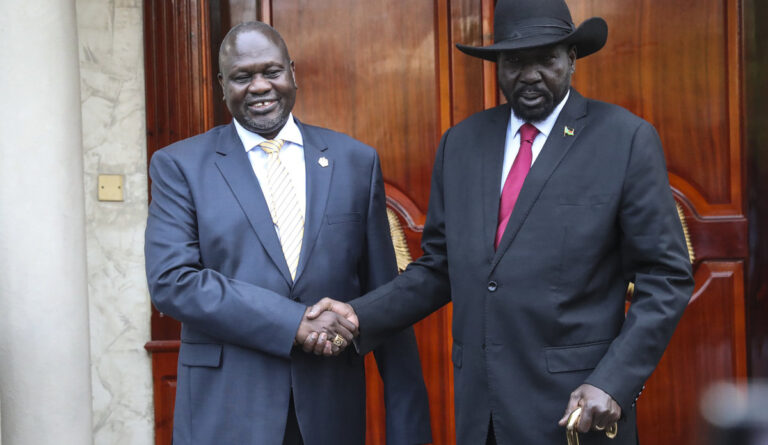South Sudan is facing an escalating security crisis as violence surges and political tensions deepen, prompting urgent intervention by regional leaders.
The 43rd Extraordinary Assembly of the Intergovernmental Authority on Development (IGAD) Heads of State and Government convened virtually on March 12, 2025, to address the deteriorating situation.
The summit underscored the need for immediate de-escalation, adherence to ceasefire agreements, and accelerated implementation of transitional security measures to prevent further instability.
Escalating Violence and Ceasefire Violations
The recent uptick in violence has raised alarm across the region, particularly after the tragic Nasir incident in Upper Nile State, where General Majur Duk, a commander of the South Sudan People’s Defense Forces (SSPDF), was killed alongside several others, including a United Nations crew engaged in an evacuation mission.
This incident has significantly heightened tensions in the capital, Juba, and other areas, following the arrest of senior Sudan People’s Liberation Movement/Army-In Opposition (SPLM/A-IO) military and government officials.
The IGAD summit expressed deep concern over the increasing violence, with reports of renewed clashes and violations of the ceasefire commitments made under the 2018 Revitalized Agreement on the Resolution of the Conflict in South Sudan (R-ARCSS).
The assembly strongly condemned the recent attacks and emphasized that dialogue remains the only viable path to resolving differences.
IGAD’s Response and Regional Engagement
Recognizing the urgency of the situation, the IGAD leaders, including President Ismaïl Omar Guelleh of Djibouti, President Hassan Sheikh Mohamud of Somalia, and representatives from Ethiopia, Kenya, and Uganda, reaffirmed their commitment to supporting peace and stability in South Sudan.
The summit commended efforts by individual heads of state who have directly engaged with South Sudanese leadership and deployed high-level delegations to Juba to facilitate de-escalation efforts.
In response to the crisis, IGAD has directed the Ceasefire and Transitional Security Arrangements Monitoring and Verification Mechanism (CTSAMVM) to conduct an independent investigation into the Nasir clashes and the attack on the UN helicopter.
This initiative aims to establish accountability and ensure compliance with peace agreements.
Call for Immediate De-escalation and Release of Detained Officials
The IGAD summit has called on all parties to immediately de-escalate tensions and adhere to the permanent ceasefire.
One of the most pressing issues is the detention of senior SPLM/A-IO officials. IGAD has urged the South Sudanese government to release these individuals unless credible evidence warrants their prosecution through transparent legal proceedings.
The arrests have further strained relations between political factions and risk undermining the fragile peace process.
Implementation of Security Arrangements
Despite commitments made under the R-ARCSS, progress on transitional security arrangements remains slow.
IGAD has urged the South Sudanese leadership to expedite the allocation of resources necessary for implementing these arrangements.
This includes the long-delayed unification of forces, which is critical for ensuring national stability and paving the way for democratic elections.
The assembly also directed IGAD’s Special Envoy for South Sudan to intensify engagement with all armed groups to secure full compliance with the ceasefire and prevent further outbreaks of violence.
Political Tensions and Need for Inclusive Governance
The security crisis has been exacerbated by a growing lack of trust among the parties to the R-ARCSS.
IGAD has called on South Sudanese leaders to commit to regular high-level meetings to resolve emerging issues and build confidence among political actors.
The organization has also encouraged greater participation of civil society, religious and traditional leaders, and grassroots movements in peacebuilding efforts.
As part of its strategy to promote stability, IGAD has announced the formation of a ministerial-level sub-committee on South Sudan.
This committee will monitor the peace process and facilitate dialogue between warring factions.
The committee has been tasked with visiting Juba to assess the situation and explore ways to reinforce the implementation of the peace agreement.
International Cooperation and Support
IGAD has called for continued collaboration with the African Union, the United Nations, and international partners to ensure full implementation of the R-ARCSS.
The summit emphasized the importance of aligning regional and international efforts to support the South Sudanese peace process effectively.
Looking Ahead: The Road to Stability
Despite the grim security situation, IGAD leaders remain hopeful that South Sudan can still achieve lasting peace if urgent actions are taken.
The upcoming period will be crucial in determining whether the ceasefire holds and whether the government and opposition can work together to prevent the country from slipping back into full-scale conflict.
The international community will be closely monitoring South Sudan’s next steps, with expectations that the government will demonstrate a firm commitment to peace by implementing agreed-upon security measures and fostering inclusive governance.
As the crisis unfolds, regional and global actors will continue to play a vital role in ensuring that the country remains on a path toward stability and development.

